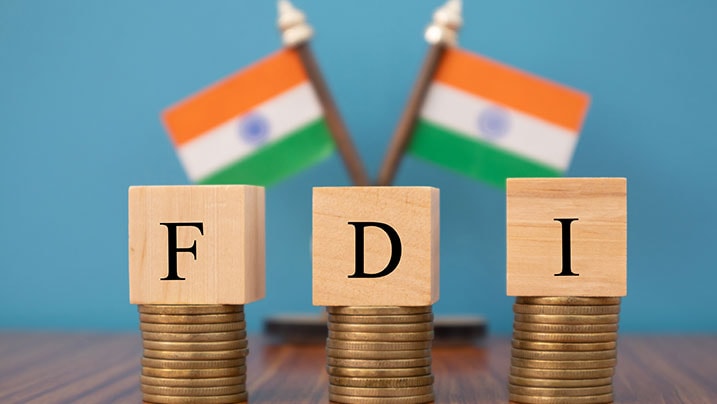By Parimal Wagh, Law Student, Mumbai
Foreign direct investment (FDI) is a key driver of economic growth and development in nations around the world. It refers to the direct ownership or control of a business in a foreign country, typically through the purchase of a minority or majority stake in the business. FDI can take many different forms, such as opening a new branch office or subsidiary abroad, or the purchase of an already-existing business or assets abroad.
The advantages of FDI are clear. It can bring in new resources, know-how, and expertise, generate job opportunities, and promote economic growth. For foreign investors, FDI presents an opportunity to diversify their investment portfolio and gain access to new markets. For the host country, FDI can be a way to attract much-needed capital and technology, and create new jobs.

Credits – IDFC FIRST
India has emerged as a popular destination for international investors in recent years. The Indian government has implemented a number of policies and measures to promote FDI, such as tax breaks, simplified regulatory processes, and other advantages. However, there are still a few obstacles that foreign investors may encounter when making investments in India.
One challenge is the complex and fragmented regulatory framework for FDI in India. While the majority of industries are now accessible to FDI through the automatic route, some still need prior approval from the Foreign Investment Promotion Board (FIPB) or the government. This may lead to uncertainty and confusion for foreign investors, and may increase the time and expense of investing in India.
Another challenge is the restrictions on FDI in certain industries. For instance, FDI is restricted to 49% in the insurance sector and 51% in the retail sector. This may limit the types of investments that are open to foreign investors. Additionally, India has a multi-layered, complex tax system that includes both federal and state taxes. This may be difficult for foreign investors to understand and follow all applicable rules.

Credits – Mercom India
Furthermore, India’s economic growth has slowed down in recent years, and the COVID-19 pandemic has significantly impacted the economy. This may make it less attractive for investors. Changes to government regulations or policies, such as modifications to tax laws or trade regulations, may also affect foreign investors.
India’s bureaucracy is another potential obstacle for foreign investors. Permits and approvals can be difficult and time-consuming to obtain, and investors may experience delays and higher costs. The legal system in India can also be slow and complicated, making it difficult to resolve disputes or enforce contracts and intellectual property rights.
Despite these challenges, India has been successful in attracting foreign capital into the country. With the liberalization of FDI regulations and programs like “Make in India” and “Start-up India,” the Indian government has demonstrated a commitment to fostering a favorable business environment for foreign investors. In 2020-21, India received a total FDI inflow of USD 81.72 billion, representing a 10% increase over the previous year and the highest-ever FDI inflow. The top industries attracting FDI inflows were computer software and hardware, services, telecommunications, trading, and the automobile industries.
Multinational corporations such as Google, Amazon, Walmart, Facebook, and Alibaba have also made sizable investments in India in recent years. Despite the difficulties and complexity associated with investing in India, the country’s sizable and expanding market, skilled labor force, and favorable demographics continue to make it a desirable location for foreign investors.
In conclusion, while investing in India may present challenges, it can also offer significant opportunities for foreign investors seeking to diversify their portfolio and gain access to new markets. With the Indian government’s continued commitment to fostering a favorable business environment, and the country’s many strengths as an investment destination, the future of FDI in India looks promising.



















































































